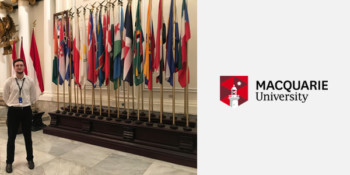Luke Gallen is a participant in the 2020 Law Professional Practicum. Luke is studying Bachelor of Laws with a Bachelor of International Studies at Macquarie University. Luke received a $3,000 New Colombo Plan Mobility Grant to support his participation in this program.
Q: Why did you decide to undertake the ACICIS Law Professional Practicum?
I wanted to engage with and better understand ASEAN countries because they play an integral role in Australia’s neighbouring region. The practicum offered by ACICIS also combined a good mix of study and practical work experience that ensured a holistic educational experience. I was attracted to this mix of opportunities, particularly in another country as diverse and relevant to Australia as Indonesia.
Q: Did you receive a New Colombo Plan Mobility Grant? If so, how did this contribute to your experience in Indonesia?
Yes, I was grateful to benefit from the NCP grant. It allowed me to fund the entirety of my accommodation, flights and food delivery. It also provided me with flexibility to travel throughout the program and better immerse myself in Indonesia.
Q: How will the Law Professional Practicum benefit or influence your future career?
One of the most significant benefits I received from completing the practicum was the experience of working overseas. The program prepared me to work and to quickly integrate myself into an international business environment. The Law Professional Practicum has further inspired me to work more closely with industries involved in developing the Indo-Pacific and its relationship with Australia.
Q: Which organisation are you interning with? What are your roles and responsibilities?
The Habibie Center. One of the most prestigious think tanks in Indonesia, founded by the former president B.J. Habibie that very broadly aims to develop sound policy around democratisation. I was an intern under the ASEAN Studies department. My role was to assist with research on topics that are relevant to events being held by the organisation (e.g. one task was to compile research on violent religious extremism in the Philippines for a comparative study to be done in the future). I also was able to pursue my own research under the mentorship of the expert staff at the center, focussing on areas of climate change law and trade (WTO) law.
Q: How have you found the work culture of your host organisation? How is it different to work experience in Australia?
Whilst I have experience of working within think tanks previously, I still found that working in a foreign country brought new challenges. Language barriers and cultural differences were obvious from the get-go. This ranged from religious differences to societal norms such as ‘jam karet’ (also known as ‘rubber time’).
I found that the conversations I had with my Indonesian colleagues were some of the most insightful and beneficial aspects of the program. Talking about a range of issues, some I had preconceived to be taboo, allowed me to better understand work culture in Indonesia and helped me better integrate myself into the organisation.
Q: Would you like to return to work in Indonesia again in future?
Yes! I would love to work and assist in areas of policy, trade or law between Australia and Indonesia, or even the Indo-Pacific region more broadly. It would give me another chance to further my Bahasa Indonesia too.
Q: What do you like to do in your spare time in Indonesia?
I joined a gym near my office to give myself structure and routine. Every weekend I found myself traveling and hiking across Java. I found that despite my love for Jakarta, the ordered chaos made it necessary to get out and about on weekends, especially to somewhere greener and more tranquil. There are also many live bands frequenting Jakartan bars and clubs.
Q: Favourite place to eat? Favourite Indonesian food?
Sate ayam dan nasi or soto Betawi from any local warung.
Q: Favourite Indonesian word/phrase?
Hati-hati! = meaning be careful. Very useful when taking a motorbike taxi around Jakarta. Always resulted in a laugh from the driver, even if I was being serious.
Q: What places in Indonesia have you visited during your practicum so far?
Travelled almost every weekend during the program. Managed to get to Pulau Macan (one of the ‘Thousand Islands’), Mt Bromo, Bogor and Yogyakarta. These places included a mix of cultural immersion and exploring hiking tracks that led to almost untouched natural wonders. My highlight was either the Chicken Church near Yogyakarta or the Sea of Sands at the foot of Mt Bromo.


